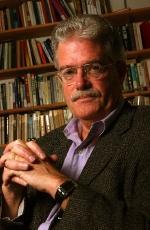 |
| Bruce Cummings, professor at Chicago University Chicago University website |
A prominent U.S. expert on Korean history bashed the Seoul government’s plan to reinstate government-issued history textbooks, raising concerns that President Park Geun-hye is attempting to unify viewpoints on history.
Calling the plan “unworkable, retrograde and stupid,” Bruce Cummings, a University of Chicago professor specializing in modern Korean and international history, said it was a reminder of her father, who ruled the country with an iron fist in the 1960s and ’70s. He said the plan also goes against the global trend, referring to criticism mounting on Russian President Vladimir Putin, who has also emphasized “one history.”
“The biggest problem is that governments do not know how to do history … Imagine Donald Trump deciding what should be in a history textbook ― it would end up as a comic book,” he said in an email interview with The Korea Herald. “The politicians will choose those historians, naturally favoring those who agree with them about which history seems correct to them.”
South Korea’s Education Ministry confirmed Tuesday the plans to use state-authored history textbooks for secondary education from 2017, on grounds that current privately published textbooks are “biased in favor of the leftists.” Park has stressed the need to “normalize history lessons” through “correct history textbooks.”
But Cummings stressed that there is no such thing as correct history.
“Historians are trained to interpret primary documents ― those historical materials that allow us to get closest to the truth of what happened ― and to develop suppositions, arguments and theories as to what happened in the past and what it means,” he said. “History is not about neutrality; it is about human beings imposing their judgments on what happened in the past, and why.”
Cummings is one of 181 scholars outside Korea who signed a joint statement opposing the government’s plan to reinstate government-issued textbooks.
The historian also said Education Minister Hwang Woo-yea’s approach to resolve social conflict via a unified textbook was misleading.
“The way to bridge social and ideological conflict is to let the truth come out, let people debate the truth in a truly democratic manner, and thus use history to pursue reconciliation with those who think differently than you do.”
Cummings accused the Korean government of seeking to denigrate scholars attempting to deal with difficult subjects, including the 1950-53 Korean War and the Jeju Uprising of 1948, which followed the shooting of protesters in an antigovernment rally.
“The model of what historians can do collectively (against such efforts) was the Truth and Reconciliation Commission,” he said, referring to a special committee set up in 2005 to investigate past rights abuses. “Because of the great work of that Commission, so much toothpaste is out of the tube that it can never be put back in. Anyone can go on the Internet or to the library and read about these events; what good would a state-issued textbook do?”
At the center of the textbook controversy in South Korea is its hostile northern neighbor, North Korea. The government alleges that current textbooks depict Pyongyang in a positive light.
While the government said the textbooks did not criticize Pyongyang enough, Cummings said that the appropriate approach instead should be a balanced treatment of the country, which is “the first step toward reconciliation between the two Koreas.”
Cummings is a writer and a professor specializing in modern Korean history and contemporary international relations. He is particularly well known for his work on the Korean War.
Cummings dedicated his 2010 book “The Korean War” in memory of the late former South Korean President Kim Dae-jung, who is famous for his “Sunshine Policy” that pushed for cross-border exchanges and reconciliation. He became the first recipient of the Kim Dae Jung Academic Award for Outstanding Achievements and Scholarly Contributions to Democracy, Human Rights and Peace in 2007.
The professor said he agreed with those who say Park’s move to reinstate government-issued textbooks was influenced by her father’s authoritarian rule, who was the Korean leader to introduce state-authored textbooks in 1974. But the issue is also directly influenced by Japan, who colonized Korea from 1910 to 1945, according to Cummings.
“It goes back to the Japanese government and politicians, now and in the past, who also prefer centralized state textbooks, and who deeply fear independent historians,” he said.
“By going down this same road of centrally controlled textbooks, President Park is playing into the hands of (Japanese Prime Minister Shinzo) Abe and appearing to be just like him.”
By Yoon Min-sik
(minsikyoon@heraldcorp.com)



